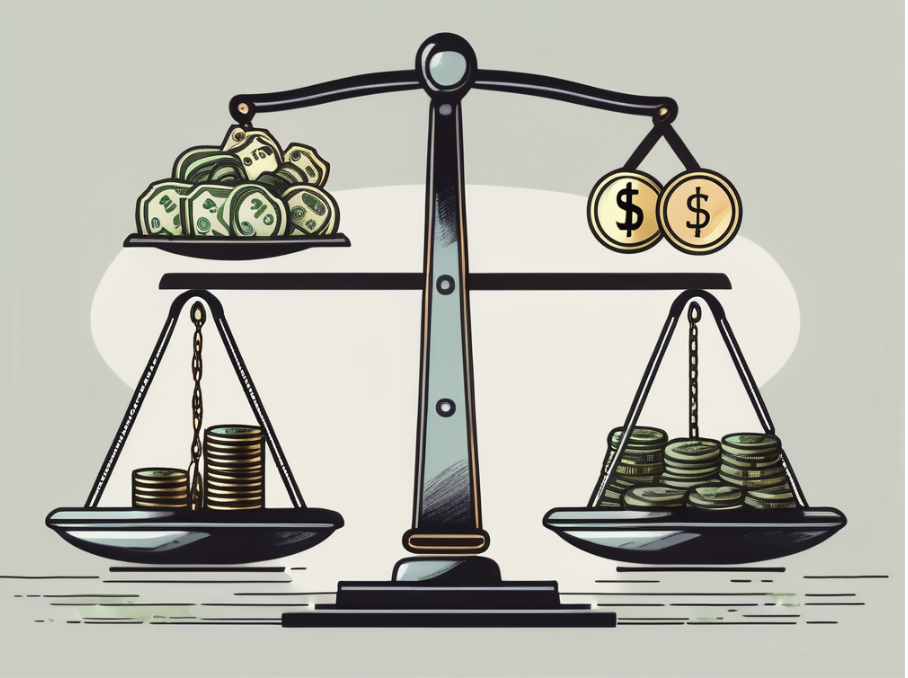How to Determine Startup Valuation for Selling Business to Investors
How to Determine Startup Valuation for Selling Business to Investors
Discover the secrets to accurately determining the valuation of your startup when pitching to potential investors.

Startup valuation is a crucial factor when it comes to selling your business to investors. It determines how much your startup is worth and how much ownership you are willing to give up in exchange for investment. Understanding startup valuation and the key factors influencing it is essential for any entrepreneur looking to attract investors. Additionally, preparing your startup for valuation and knowing the various methods used to determine valuation can greatly impact the success of your negotiations.

Understanding Startup Valuation
Understanding Startup Valuation
Startup valuation refers to the process of determining the worth of a startup company. It is a complex calculation that takes into account several factors, including the company’s financial performance, market potential, intellectual property, and more. Startup valuation is not an exact science and can vary depending on different methodologies and investor perspectives.
When it comes to startup valuation, there are various approaches that investors and entrepreneurs can take. One common method is the discounted cash flow (DCF) analysis, which estimates the present value of a startup’s future cash flows. This method considers the time value of money and helps investors assess the potential return on their investment over time. Another approach is the market approach, which compares the startup’s valuation to similar companies in the market.
The Importance of Startup Valuation
The Importance of Startup Valuation
Startup valuation is crucial for both entrepreneurs and investors. For entrepreneurs, an accurate valuation helps them understand the potential value of their business and what equity they should offer to investors. It also provides a benchmark for future negotiations and fundraising efforts. Additionally, a well-defined valuation can attract potential partners and employees who are interested in the startup’s growth prospects.
For investors, valuation helps them assess the risk and potential return on their investment. By understanding the startup’s valuation, investors can make informed decisions about whether to invest and how much equity they should acquire. Moreover, startup valuation plays a significant role in determining the terms of investment, such as the valuation cap and the pre-money and post-money valuation.
Key Factors Influencing Startup Valuation
Key Factors Influencing Startup Valuation
Several key factors can influence startup valuation:
1. Financial Performance and Projections:
Investors will closely analyze a startup’s financials, including revenues, expenses, and profitability. They will also consider projected future growth and revenue streams. A startup with a track record of consistent revenue growth and healthy profit margins is likely to have a higher valuation. On the other hand, startups that are in the early stages of development may have a lower valuation due to the higher level of risk involved.
2. Market Size and Potential:
A startup operating in a large and growing market is likely to have a higher valuation. Investors look for startups with significant market potential and a unique competitive advantage. Factors such as market share, customer demand, and the startup’s ability to scale can all impact its valuation. Startups that can demonstrate a clear understanding of their target market and a solid plan for capturing market share are more likely to attract higher valuations.
The Role of Intellectual Property: Intellectual property, such as patents and trademarks, can significantly impact a startup’s valuation. Strong IP protection can make a startup more attractive to investors. It provides a competitive advantage by preventing competitors from replicating the startup’s products or services. Investors are more likely to assign a higher value to startups that have unique and defensible intellectual property.
3. Team and Execution:
The startup’s team and their ability to execute the business plan can also influence its valuation. Investors look for experienced and capable founders who have a track record of success in their industry. A strong team with complementary skills and a proven ability to execute can increase the startup’s chances of success and, consequently, its valuation.
4. Competition and Market Dynamics:
The competitive landscape and market dynamics can affect a startup’s valuation. Investors consider the level of competition in the market and the startup’s ability to differentiate itself. Startups that have a unique value proposition and a sustainable competitive advantage are more likely to command higher valuations. Additionally, investors may assess the startup’s ability to adapt to changing market conditions and navigate potential challenges.
Overall, startup valuation is a complex and multifaceted process that requires careful consideration of various factors. It is important for both entrepreneurs and investors to conduct thorough due diligence and seek professional advice to ensure a fair and accurate valuation. By understanding the key factors influencing startup valuation, stakeholders can make informed decisions that align with their goals and objectives.

Preparing Your Startup for Valuation
Preparing Your Startup for Valuation
When preparing your startup for valuation, it is vital to have a comprehensive understanding of your company’s financials and projections. This information will help potential investors assess the viability and growth potential of your business.
One important aspect to consider when preparing your startup for valuation is the financial performance and projections. Investors will carefully analyze your startup’s financial performance, including revenue growth, profit margins, and cash flow. They will also assess your financial projections to understand how your business is expected to perform in the future.
It is crucial to present accurate and well-supported financial data to potential investors. This includes providing detailed financial statements, such as income statements, balance sheets, and cash flow statements. Additionally, you should prepare a comprehensive financial model that outlines your revenue streams, cost structure, and projected financial performance over a specific period of time.
Financial Performance
Investors will closely examine your startup’s financial performance to evaluate its profitability and sustainability. They will analyze key financial metrics, such as gross margin, net profit margin, and return on investment. It is important to highlight any positive trends or milestones achieved, such as consistent revenue growth or improving profit margins.
Furthermore, investors will assess your startup’s ability to generate and manage cash flow. They will want to understand your cash flow cycle, including the timing of cash inflows and outflows. Demonstrating a healthy cash flow position and effective cash management practices will enhance your startup’s valuation.
Financial Projections
In addition to analyzing your startup’s historical financial performance, investors will also evaluate your financial projections. These projections provide insights into your business’s expected growth and profitability in the future.
When preparing financial projections, it is essential to base them on realistic assumptions and market research. Investors will scrutinize the assumptions underlying your projections to ensure they are reasonable and achievable. It is crucial to provide a detailed explanation of the factors driving your projected revenue growth, cost structure, and profitability.
Moreover, it is advisable to prepare multiple scenarios or sensitivity analyses to demonstrate the potential impact of different market conditions or business strategies on your financial projections. This will help investors assess the robustness of your business model and its ability to withstand potential challenges or changes in the market environment.
Market Size and Potential
Your startup’s market size and potential are critical factors that can greatly impact its valuation. Investors will want to see a significant addressable market and evidence of your ability to capture market share.
When presenting your startup’s market size and potential, it is important to provide comprehensive market research and analysis. This includes identifying your target market, understanding its size, growth rate, and key trends. Investors will be interested in knowing the total addressable market (TAM), serviceable addressable market (SAM), and your projected market share.
Furthermore, it is crucial to demonstrate a clear value proposition and competitive advantage that sets your startup apart from existing players in the market. This can include factors such as innovative technology, unique product features, or superior customer experience. Investors will be more inclined to value your startup higher if they believe it has a strong potential to capture a significant portion of the market.
The Role of Intellectual Property
If your startup holds valuable intellectual property, such as patents or trademarks, it can positively impact its valuation. Strong IP protection demonstrates uniqueness and defensibility, making your business more attractive to investors.
When preparing your startup for valuation, it is essential to identify and protect your intellectual property assets. This includes conducting a thorough IP audit to identify any existing patents, trademarks, copyrights, or trade secrets that your startup owns. It is advisable to seek legal advice to ensure proper protection and enforcement of your IP rights.
Investors will be interested in understanding the scope and strength of your intellectual property assets. This includes assessing the market value of your patents or trademarks, evaluating any licensing or royalty agreements, and determining the potential for future IP-related revenue streams.
In conclusion, preparing your startup for valuation involves a comprehensive understanding of your company’s financials, projections, market size, and intellectual property. By providing accurate and well-supported information in these areas, you can enhance your startup’s valuation and attract potential investors.
Valuation Methods for Startups
Valuation Methods for Startups
There are several methods used to determine the valuation of startups:
1. Discounted Cash Flow Analysis
The discounted cash flow (DCF) analysis estimates the present value of a startup’s future cash flows. It takes into account the timing and risk of those cash flows, providing investors with a valuation that reflects the time value of money.
2. Comparable Company Analysis
A comparable company analysis (CCA) compares your startup to similar companies that have recently been sold or have received funding. This method relies on market multiples and can provide a benchmark for your startup’s valuation.
3. Venture Capital Method
The venture capital method is a popular valuation approach used by early-stage investors. It focuses on estimating the return on investment based on future rounds of financing and potential exit scenarios. This method allows investors to determine the valuation necessary to achieve their desired returns.
Negotiating with Investors
Negotiating with Investors
Once you have determined your startup’s valuation, it is crucial to effectively negotiate with potential investors. Successful negotiations involve presenting your valuation in a compelling manner and understanding investor expectations.
Presenting Your Valuation to Investors
When presenting your valuation to investors, it is essential to provide a clear and well-supported explanation of how you arrived at the valuation figure. Include relevant financial data, market analysis, and potential growth opportunities to demonstrate the value of your startup.
Understanding Investor Expectations
Understanding investor expectations is critical during negotiation. Investors will consider factors such as expected returns, exit strategies, and the level of control they will have in the company. Aligning your startup’s goals and objectives with those of potential investors will lead to more successful negotiations.
Navigating Negotiations Successfully
Negotiations can be challenging, but with proper preparation and a clear understanding of your startup’s value, you can navigate the process successfully. Be open to compromise, demonstrate confidence in your business model and projections, and seek win-win solutions that benefit both your startup and the investor.
In Conclusion
In Conclusion
Determining startup valuation for selling your business to investors is a critical step in the fundraising process. Understanding the key factors influencing startup valuation, preparing your startup for valuation, and knowing the various valuation methods can significantly impact your success in attracting investors. Effective negotiation skills and aligning your startup’s goals with those of potential investors are also vital for a successful funding round. With careful planning and a well-supported valuation, you can confidently present your startup to investors and secure the investment you need to grow your business.
It All Starts With a FREE consultation!
Every client’s needs are unique and require varying amounts of time and attention. You can use this form to let us know what you’re looking for, and we’ll reach out to you to schedule an appointment and talk about rates for your business needs.
Please be as detailed as possible with what work is needed, what industry your business is in, and where you are located.
Our team will contact you with in 2 business days to set up the first meeting. We will make sure all your needs are taken into account when selecting the package and type of services you need.







Stay In Touch